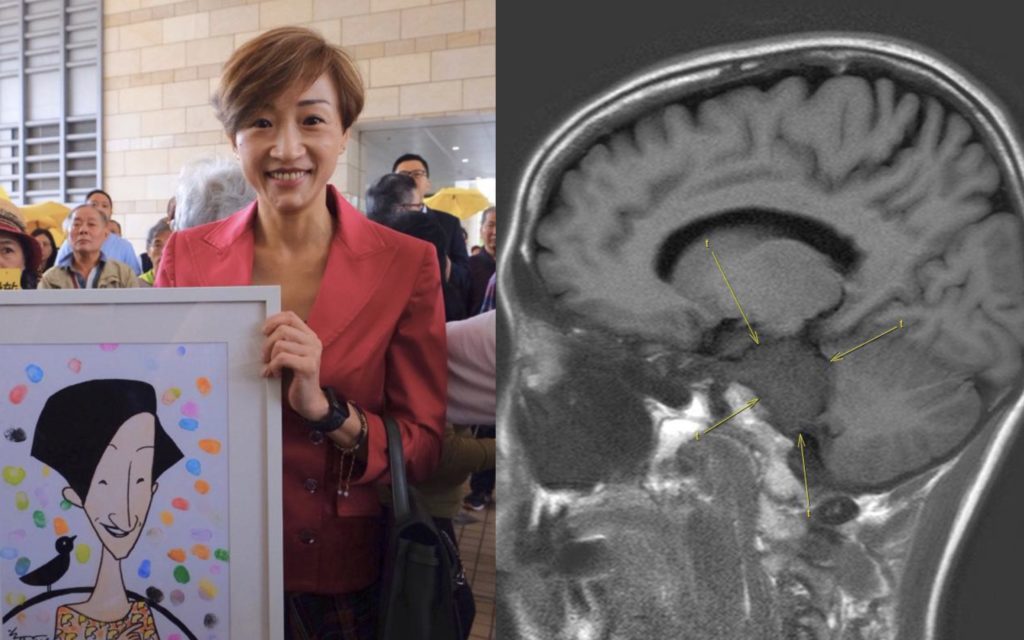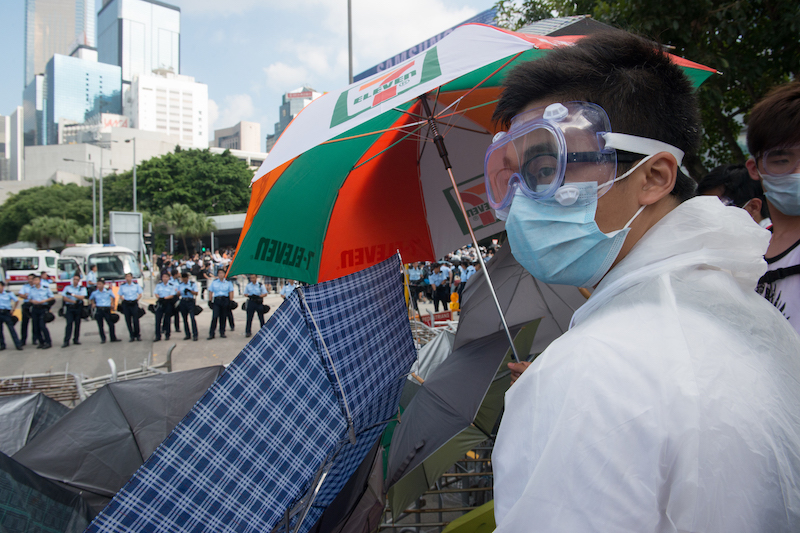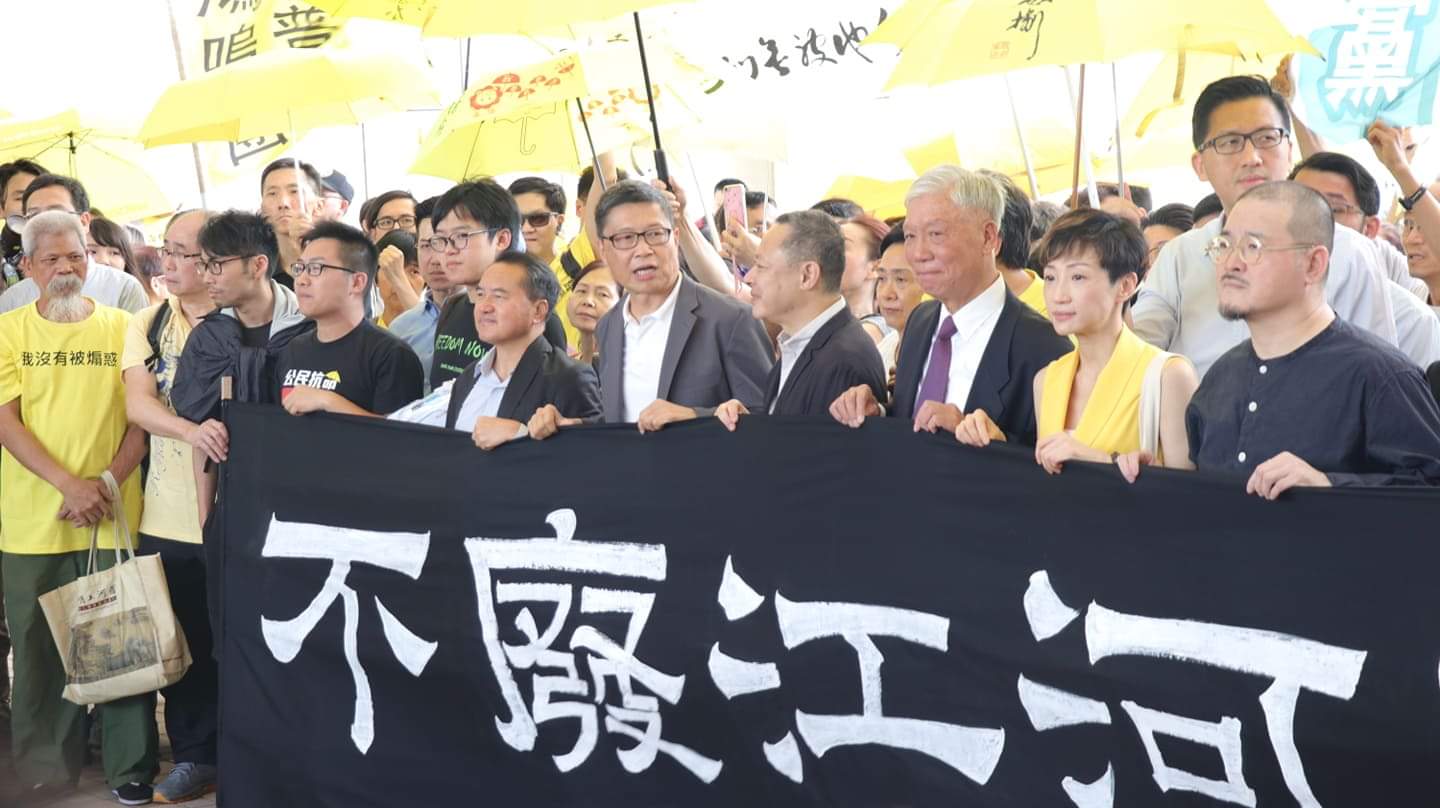Seven of nine pro-democracy activists were handed prison sentences today for their roles in the Umbrella Movement protests, which brought swathes of the city to a standstill for months in 2014. One defendant saw her sentencing delayed due to a medical condition, while another was given community service.
Arguably the three most prominent defendants are sociology professor Chan Kin-man, 60, law professor Benny Tai, 54, and Baptist minister Chu Yiu-ming, 75. The trio founded the “Occupy Central” civil disobedience campaign, which would go on to merge with a separate student protest movement to form the broader Umbrella Movement.
All three were convicted under controversial colonial-era public nuisance laws earlier this month in a common law prosecution that carried much steeper penalties than typical statutory public nuisance laws. Chan and Tai were both sentenced to what amounts to 16 months behind bars, while Chu saw his 16-month sentence suspended, HKFP reports.
Before entering the court, Tai told reporters he was “still peaceful and hopeful,” and ready to face the sentencing.
Through their lawyer, Chan and Tai said they would appeal their sentences, the South China Morning Post reports.
One of the defendants, sitting pro-democracy lawmaker Tanya Chan, had her sentencing delayed until June to allow her to receive urgent surgery for a sizeable brain tumor discovered just a week ago.

Fellow defendant Shiu Ka-chun, who is also a pro-democracy lawmaker, was sentenced to eight months, as was student activist Raphael Wong. Shiu’s lawyer said he would be appealing both his sentence and conviction.
Wong, meanwhile, shouted as he was led away by guards: “Our determination to fight for democracy will not change.”
Student leader Eason Chung and former politician Lee Wing-tat were both given suspended eight-month sentences, and former student leader Tommy Cheung was sentenced to 200 hours of community service.
At the sentencing, Judge Johnny Chan noted the defendants’ lack of regret for the headache the Umbrella Movement’s civil disobedience caused the public.
“Regret does not mean giving up their political beliefs or demands, but regret for the inconvenience or sufferings experienced by the public,” Chan said.
“It is an apology the public rightly deserves from the defendants but was never received.”
The jail terms are the steepest yet for anyone involved in the 79-day protest, which vividly illustrated the huge anger — particularly among Hong Kong’s youth — over the city’s leadership and direction.

Authorities in Hong Kong and the mainland have defended the prosecutions as a necessary measure to punish the leaders of a direct action movement that took over key intersections of the city for many weeks.
But activists and rights groups have argued that the use of the vaguely worded public nuisance laws — combined with a steeper common law punishment — is an insidious blow to free speech and a new tactic from prosecutors.
“The long sentences sends a chilling warning to all that there will be serious consequences for advocating for democracy,” said Maya Wang, Human Rights Watch’s senior researcher on China.
Amnesty said the four men who were jailed were “prisoners of conscience” and that the record-breaking sentences set a “dangerous precedent.”
Carefully worded criticism came in from Western diplomats in the city.
Washington’s consulate said it was “concerned by the Hong Kong Government’s decision to bring these charges,” while Britain’s added that it would be “deeply concerning” if the jailings “were to deter the people of Hong Kong from participating in peaceful protest in the future”.
There were emotional scenes outside the courthouse as the four leaders were driven away in a prison van as supporters shouted “add oil!” — a popular Cantonese phrase of encouragement.
Speaking after the sentencing, Tanya Chan told the crowds: “I hope Hongkongers will not lose hope, will not be afraid, will not have regrets or back down now”.
Many supporters were holding umbrellas, an emblem of the 2014 protests after they were used by young demonstrators to defend themselves against police batons, tear gas canisters, and pepper spray.
While Hong Kong enjoys rights unseen on the Chinese mainland under a 50-year handover agreement between Britain and China, there are fears those liberties are being eroded as Beijing flexes its muscles and stamps down on dissent.
The Umbrella protests had originally called for universal suffrage in electing Hong Kong’s leader, as well as the right to choose nominees for the role. The chief executive is currently selected from a group of pre-approved candidates by a group of just 1,200 largely pro-Beijing electors.
NOTE: This story has been updated to include additional information.





Reader Interactions